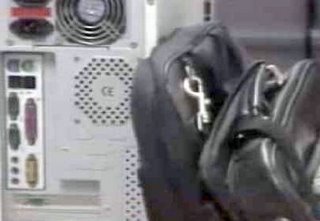MORE Pics - Couple RAKING in RM100,000 Per MONTH Caught in PENANG Distributing VCD & DVD OPTICAL DISCS Via WEBSITE & SENDING By Courier Service
 ABOVE: The house (parked with the two new cars)in Jelutong, Penang raided by the local Anti Piracy unit from the Domestic Trade & Consumer Affairs Ministry; BELOW; The Director, M Guna Seelan
ABOVE: The house (parked with the two new cars)in Jelutong, Penang raided by the local Anti Piracy unit from the Domestic Trade & Consumer Affairs Ministry; BELOW; The Director, M Guna Seelan Illegal business is always a lucrative business and pirating compact Optical discs is a “get rich fast” one but not for long as the long arm of the law is everywhere. This
Illegal business is always a lucrative business and pirating compact Optical discs is a “get rich fast” one but not for long as the long arm of the law is everywhere. This  ABOVE: The computer and laptop confiscated and BELOW: The unsent Optical VCD & DVD Packed in DHL Courier Cardboard Box
ABOVE: The computer and laptop confiscated and BELOW: The unsent Optical VCD & DVD Packed in DHL Courier Cardboard Box
And reports indicated with the knowledge they learned in their IT studies, they managed to block ALL Malaysia IPs visiting their site. This is a relatively simple technique used by some bloggers, like the Malaysian pioneer Tim Yang at one time in June 2004. Check here.
But the MPA (Motion Picture Association of America, see below) outwitted them and with the aid of the local Anti-Piracy unit their operating base at home was raided and they were arrested.
And being pirates themselves, why bother to study to get their Master & MBA when pirated ones are easily available for a small fee from a lot of pirated U's.
 ABOVE & BELOW: Samples of the well packed VCD & DVD (supplied by local manufacturers) seized from the raided house
ABOVE & BELOW: Samples of the well packed VCD & DVD (supplied by local manufacturers) seized from the raided house
= = = = = = = = = =
She's in the soup; They went for the high life, they went into cyber piracy
A day after their operation was busted in
Sources from the Domestic Trade and Consumer Affairs Ministry told the New Straits Times that the 29-year-old boyfriend was also pursuing a Master’s in Business Administration at a local university. From documents seized from the house, the authorities estimate the couple could have raked in as much as RM1 million in the past one year from their operations.
"The suspects are IT experts. This they displayed in setting up the website," the source said. "They made it impossible for anyone using a Malaysian Internet service provider to access the website. It was only available to foreigners." The couple and a 33-year-old man involved in a similar but unrelated case were taken to the
They are being investigated under the Copyright Act 1987 and face fines of up to RM20,000 per optical disc seized or five years’ jail or both.
The woman’s father (top civil servant?) was present in court and tried to get her released on bail. In Thursday’s operation, officers from the ministry’s Internet Piracy team and representatives from the Motion Picture Association conducted simultaneous raids on two houses in Jelutong and Ayer Itam.
The houses had been traced as the origins of websites operated separately, one by the couple and the second by the 33-year-old man.
The couple is part of a growing trend of computer-savvy youths who use their skills to make a fast buck. Over the past two weeks, a group of youths was arrested by police officers from the Federal Commercial Crime Investigation Department for phishing. Phishing involves using email and fake websites to lure Internet users into providing their personal banking details, which are then used to steal from their accounts.
The group managed to steal RM36,000 from more than 20 bank customers over a two- week period, which resulted in police reports being lodged.
= = = = = = =

The MPA’s key priorities are: Content Protection (through legislation, technology and enforcement), Market Access, Content Regulation and issues associated with the Internet.
General MPA responsibilities in the region include: Anti-Piracy:
Anti-Piracy actions are taken by the individual Anti-Piracy Organizations nationally but are supervised by the Anti-Piracy team based in
Internet piracy is growing at a faster rate in
Despite such promising initiatives, progress towards compliance with
Despite ever-increasing enforcement activity and seizures of pirate discs by the MPA’s 35 anti-piracy programs in the region, the problem of optical disc piracy continues to grow. In the first half of 2005, pirate DVD seizures in the EMEA region exceeded 3.6 million discs. Seizures of burned DVD-Rs grew by 70% in the first six months to almost 2 million discs, and seizures of DVD-R burners jumped by 32% in the same period to almost 3,000.
Local DVD-R burning across EMEA is being fuelled by rising Internet downloading, lower prices for burners and for blank media, and by increased Customs and local anti-piracy program vigilance against pirate imports of pressed discs. Particularly noteworthy is the explosive increase of DVD-R burning in the
In other markets, such as
Finally, although it is not yet a significant problem in


0 Comments:
Post a Comment
<< Home